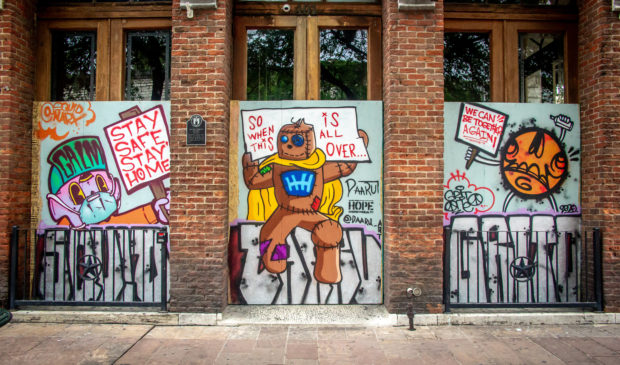Music Commission backs Council proposal to unlock $4.5M to aid artists, venues
Thursday, April 9, 2020 by
Chad Swiatecki The Music Commission has asked the city to protect and replenish the recently created Live Music Fund if any of it is used to help musicians and music venues impacted by the Covid-19 pandemic.
At a special meeting called for Wednesday – making the group the second city commission to meet virtually – the nine members present unanimously approved a resolution circulated to City Council members last month, but not formally voted on, that asks the city to create a live music disaster relief fund.
That vote was later amended to express support for a pair of Council resolutions scheduled for action today that could bring relief to those in the music industry, which saw its busiest time of year vanish with the cancellation of last month’s South by Southwest festival.
Discussion on the amendment focused mostly on Council Member Kathie Tovo’s resolution that directs the city manager to tap the $3.5 million Live Music Fund as well as the Creative Space Assistance Fund – which was recently increased to $1 million from its original $750,000 – to deliver assistance for musicians and music venues. Tovo’s resolution also calls for the Economic Development Department to create an online portal to showcase performances by Austin musicians and allow viewers to tip the musicians and purchase merchandise.
The support for Council action came with several caveats, including the direction that the Live Music Fund be used only as a last resort to assist creatives and associated business if no other state or federal dollars are available, and that the city commit to replace the funds in the future.
The commission also asked that a nonprofit group or some other entity outside of the city apparatus be put in charge of allocating the aid, with guidance given by an advisory group the commission voted to form made up mostly of private citizens involved in the music industry.
Discussion on the support for Tovo’s resolution focused on the likelihood of using the Live Music Fund, which was created last fall using Hotel Occupancy Tax revenue after years of behind-the-scenes brokering by music stakeholders. Many involved in the structure’s creation intended that the initial $3.5 million and subsequent annual infusions of hotel tax money would be used in a self-sustaining way.
“My worry is the Live Music Fund is not intended as a disaster relief fund as I understand it, and I would think we would want to focus on disaster relief funds for disaster relief, and leave the infrastructure and future money in place because we’re going to need that once we’re through all this,” Commissioner Graham Reynolds said.
“We worked for years and years to get this infrastructure-based ongoing funding for an already deeply troubled live music scene, and to dig into that to address this immediate and urgent issue seems like a poor fit,” Reynolds continued.
Chair Rick Carney said the need to get money moving quickly into the hands of musicians and businesses necessitates changing the use of the Live Music Fund from its long-intended purpose.
“The scope of the emergency and the timeliness is what changed my mind to the idea of a one-time true emergency use of these funds to help venues stay afloat, because if they’re not viable by the time the clouds clear and we’re back to whatever normal is, it won’t make any difference if those funds are there since there won’t be any venues to use those funds,” he said.
“This is so far the only lifeline that anyone on Council has given us. Until this thing happened I never would have thought about pulling any money that’s associated with the Live Music Fund, because getting this thing up and running has been a major accomplishment and the idea of making it sustainable is what made that happen because it wouldn’t be a one-time thing and would be something we could build on,” Carney said.
The commission also voted to have another special meeting soon to further discuss relief efforts. Because of the need for boards and commissions to conduct their business quickly, the city clerk’s office has removed the previous restriction that those groups could only hold one special meeting per quarter.
The Austin Monitor’s work is made possible by donations from the community. Though our reporting covers donors from time to time, we are careful to keep business and editorial efforts separate while maintaining transparency. A complete list of donors is available here, and our code of ethics is explained here.
You're a community leader
And we’re honored you look to us for serious, in-depth news. You know a strong community needs local and dedicated watchdog reporting. We’re here for you and that won’t change. Now will you take the powerful next step and support our nonprofit news organization?






